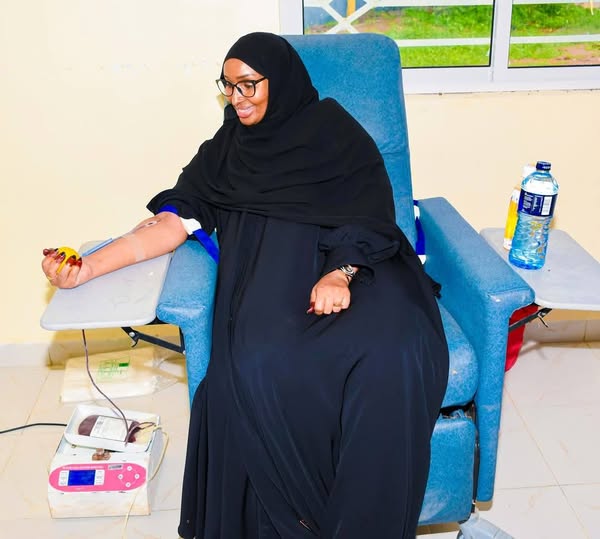 Wajir governor’s spouse Rukia Abdinasir donates blood./STEPHEN ASTARIKO
Wajir governor’s spouse Rukia Abdinasir donates blood./STEPHEN ASTARIKOWajir residents have been urged to donate blood regularly to help patients requiring transfusions as a lack of a donation culture threatens the lives of patients and accident victims.
The county has been struggling with a severe scarcity of blood and blood products, putting at risk vulnerable groups, including expectant mothers and Kala-azar patients, who depend on timely transfusions.
The Wajir governor’s wife, Rukia Abdinasir, on Monday visited the Wajir Satellite Blood Transfusion Centre, where she led a donation drive and rallied residents to donate regularly.
She said the single act of kindness in donating blood could save a life.
“Our people should adopt the practice of donating blood often instead of waiting for a whole year to do it. As we are aware, blood is a lifeline for many mothers, children, and patients battling serious illnesses,” Rukia said.
“We all need to stick together and help each other. If you give to others, it will come back multiple times. By donating blood, you become healthier and save lives, maybe the lives of your mother, father, sister or a close relative.”
The Wajir county Satellite Blood Transfusion Centre is open from Monday to Saturday, from 8 am to 6:30 pm.
The scarcity of blood and blood products puts at risk the lives of vulnerable groups.
The county is still struggling with the Kala-azar outbreak that has claimed more than 20 lives and infected more than 500 patients since September 2024.
Kala-azar is a serious and potentially fatal disease caused by parasites of the sandfly and is transmitted through bites. It damages the spleen and liver. If left untreated, it can be fatal.
Last month, the Kenya Red Cross Society’s Northeastern branch urged residents to donate blood regularly.
Whole blood generally can be donated every 56 days; platelets can be donated once every seven days, up to 24 times a year.
The region is predominantly Muslim, however, there’s no specific evidence Muslims in Kenya are reluctant to donate blood for religious reasons. The lack of a blood donation culture and other factors contribute to the shortage. Many Kenyans, regardless of faith, are hesitant due to myths, fears about testing, and a lack of awareness about the importance of blood donation.
Fatuma Mohamed, 35, a social health worker donor, said voluntary blood donations preserve the spirit of solidarity and called it the best form of charity.
“By donating blood, you become healthier and save lives,” she said, “so let’s all embrace the culture of donating blood.”
Regular blood donation is linked to lower blood pressure and a lower risk of heart attacks.
Speaking to the press a procession to mark 60 years of humanitarian action, Hassan Musa, KRC Northeastern region head, said many lives that could have been saved have been lost because the victim or patient lacked a blood transfusion.
“By donating blood, we give back to society in the form of saving lives, not just of people that you know, but those in dire need of help,” Musa said.
Instant Analysis
Last month the Kenya Red Cross Society raised concern over blood shortage across the major hospitals in the region. Hassan Musa, the regional Red Cross head, said the shortage has put the lives of many patients and victims in danger.
He called on residents across the region to make it a habit to donate blood, saying the generous gesture would go a long way in saving lives.











